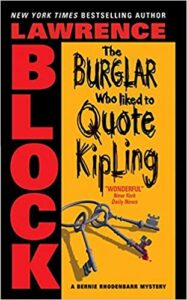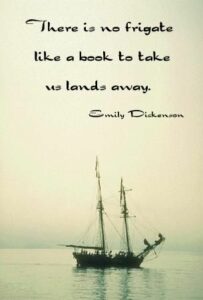I shifted earlier today from the “manic” gear of my personality into the “depressive.” I saw it coming, given that this is the time of year where we turn where the day is of darkness more than of light. To pile on, if you will, a friend of long standing remarked during a telephone conversation about how many books and authors there are plying their wares, and asked rhetorically, “Why bother?” Indeed. Through this and other static, I could hear Churchill’s black dog baying in the wee hours, even though he was not yet in sight.
I, fortunately, had some St. John’s Wort at the ready in the form of a Lawrence Block novel entitled The Burglar Who Liked to Quote Kipling, which is part of the Bernie Rhodenbarr series. Block may be semi-retired now (he keeps threatening to stop, but only pauses), but when he was more actively pursuing his career he was quite prolific. It is difficult to have read everything he has written to date and somehow I had missed reading this title even though I have had a copy of it for almost a decade. One cannot come away from a Block novel without chuckling here, smiling there, and learning something along the way. There were some lessons presented in this book— how to bypass a home burglar alarm (circa 1979), for example — that I already knew, but —no surprise — there was plenty that I did not. 
I learned that St. John of God is the patron saint of booksellers, and, interestingly enough, of alcoholics (there is a lesson here, I think). I should digress to note, in case you are wondering, that the patron saint of writers and authors is St. James Sco… I mean, St. Francis de Sales.
The Burglar Who Liked to Quote Kipling also includes also a quotation, however, that Block just kind of tosses out there and which, I have appropriated as the title of my offering du jour to you.
“There is no frigate like a book.” That quotation is the title of a poem by Emily Dickinson. I must have been absent (or, more than likely, daydreaming) when poetry was covered in my Senior English because it was a case of first impression for me. I should have paid attention in class because it contains an important observation about the reason that we read and write, succinctly stated in seven words. I stopped reading the book for a bit and started down the internet rabbit hole, doing a bit of research concerning Dickinson, because I could, thus proving Dickinson’s point. You can’t hop off of a frigate in the middle of the ocean (well, you could, but it’s not a good idea) but the blessing — and yes, the curse — of a book is that you can stop reading, set it down, and start up again. I learned as a result of my digression that Dickinson was a virtual recluse for much of her life. She communicated mostly by letter (for those of you under thirty, a “letter” was something that people wrote to each other before texting became popular). Dickinson wrote approximately 1,800 poems, of which not even a dozen were published during her lifetime. She apparently, unlike my friend, was not concerned with the number of other authors who were out there already published and plying their trade. She felt the need to write, so she did, to the exclusion of much, if not all, else. It is interesting to me that relatively few of her contemporaries (we’re talking mid-19th Century) are even remembered, let alone mentioned in, for example, a Paul Simon song.
You may be click-click-clicking along on your word processor in obscurity right now. Keep doing that. If you get discouraged, think of Emily Dickinson, her life, and her words. There is no frigate like a book. You can build it at and on a desk and it can take you and your audience to places that they never would have imagined but for you. You can’t top that with a Ferrari or a Nintendo Switch or even Netflix, either.
The gloom is now officially shaken off, thanks to a contemporary author, his burglar creation, and a long-deceased reclusive poet. It’s time to go back to work. First though, please tell us: who or what shakes you out of your doldrums, if doldrums you have, and why? Whether you choose to share or otherwise, thank you for being here.





Glad you’ve emerged from the doldrums, Joe. Books (and poems) are wonderful things that can sail us across those dead-calm waters. And now you have me wondering which book it was that I read where the doldrums played an important role. (The actual ones, not the psychological ones.)
First! Good morning, Terry. Now that you mentioned it…I recall a book like the one you mentioned and I cannot recall the title, either. If it comes to me I will duck back and submit it to see if it’s the one you are thinking of and would ask that you do the same. Thanks.
I had occasion just recently to have my protag recall her H.S. study of “The Rime of the Ancient Mariner” when she was in the doldrums. Not a novel, of course.
Thanks once more, Joe. Hartlaub Saturday Mornings are a great antidote to the blues.
I must not get down on myself for not having read Block–I’ve read stuff that others can get on themselves for not having read, should they so choose.
When I need boosted, I’ll either go back to Lord Peter Wimsey or Albert Campion or find a new Miss Phryne Fisher.
And, of course, a Dickinson poem is homeopathy for the soul.
Thank you, Eric. You’re very kind. Re: Peter Wimsey…Dorothy Sayers is experiencing a revival of sorts. I was introduced to her work in fifth grade by Sister Theresa Mary who taught me that it was okay to love books in general and mysteries in particular.
“Bunter.”
“Yes, m’Lord?”
“The Napoleon brandy…”
Joe and Terry, was it The Old Man and the Sea? I seem to recall passages about doldrums.
To carry on with Hemingway, the old man worked his butt off trying to get the huge fish to shore, only to arrive with a skeleton, meat all eaten off.
Sounds like a writer’s life at times. Sigh.
Friendships with other writers pull me out of the doldrums. Also, a compliment from a reader goes a long way.
Thanks, Joe, for your wise insight into the writer’s brain and soul.
Thank you, Debbie, you’re easy to please. And thanks for the suggestion of The Old Man and the Sea. It wasn’t the book I was thinking of but it has been far too long since I’ve read it.
The Old Man and the Sea took place near Cuba, and the Doldrums are somewhere else. Still trying to remember the book. Or was it a television movie? Dang, getting old sucks.
Good morning, Joe. Thanks for the post. Glad the gloom has dissipated.
I can’t think of a novel or author who consistently helps me escape the wintertime depression. Probably, the most helpful for me are nonfiction, books on the wonderful design of this world and our purpose here. And getting outside with physical work really helps, too.
I found your comments on Dickinson motivating. I’m click, click, clicking away, knowing that my books will be read by only a few. I’m hedging my bets, though, hoping that someday my grandchildren (for whom the books are written) will find them and read them to their children.
Have a great day, and thanks for the post!
Thank you, Steve. Your words and suggestions are much appreciated.
As far as your books only being read by a few…you never know. These days you’re only a Netflix series away from fame. I’m not joking, either. The story of how Sookie Stackhouse and her creator became overnight sensations (after laboring for years) thanks to the HBO series True Blood is instructive. It could happen to anyone and I hope it happens for you. Enjoy the weekend!
Different things can shake me out of the doldrums. Just depends on the day and the doldrum. But a research trip I took yesterday for a book I’m brainstorming was very motivating for my writing.
I’m in the process of brainstorming with a friend for a book set in 1917. One of the things we needed to know for research is how newspapers were printed back then. Short answer: the Linotype casting machine generated the type and then the papers were pressed.
Yesterday, I got to see the only working linotype in the state of Arizona and that thing was AWESOME! The linotype was deemed the 8th wonder of the world and I believe it. For 500 years before that, all type had been set by hand. Then Mr. Morganthaler invented the linotype in the late 1880’s, which revolutionized printing and was used up until probably the early 1970’s before computers, etc. took over.
That machine is so complex and wonderful I don’t know how Morganthaler even imagined all the moving parts required to make it work.
I don’t know how anyone could be a lover of the written word and not be totally in awe of this machine. After all, many of the books I’ve read in my life time were printed using it.
WOW!
WOW! is right, BK. Thank you so much for sharing this. I didn’t know that the linotype machine was invented in the late 19th Century — I always had the vague notion that it was later than that — so your account was quite a revelation for me. I did know that setting type by hand was a laborious, frustrating, and dirty job. I would have loved to be present for Morganthaler’s Eureka! moment(s). Thanks again. And good luck with that WIP!
Ah yes…the linotype. I am old enough to have worked in the news biz when we had to go up to the composing room and release our news pages after they were typeset. The process was called hot type. Those great, dirty, noisy machines were wonderful to behold. Loved, too, the old guys who ran them. (They were always old guys). Loved standing behind them watching their inky fingers fly over the keyboards. And if they made a mistake setting a line, they would run their fingers down the left side of the keyboard and out would come “Etaoin shrdlu.” That was code for the proofreaders on the carts holding the full page (the carts were called turtles for some reason) to remove the bad line.
The turtles held one complete page but everything on it was backwards, so the editors who could read it were prized. I can read and write backward (I think it has something to do with being left-handed), so I spent a lot of time hanging around linos. My second book, a sexy-fueled romance, was set in the news biz. It was called “Hot Type.”
I wanted to name one of my cats etaoin but was talked out of it. Walt Kelly named a character in Pogo Etaoin Shrdlu. He was a bookworm who criticized Webster’s Dictionary for bad spelling.
And that is my esoteric contribution to relive your doldrums. Thanks for sparking good memories.
I love it! Thanks, Kristee!
Thanks for this comment. Yes, many of the things you touched on we learned yesterday in our tour. Cool stuff!
Louis L’Amour is my go to doldrums stopper. In particular, The Sacket Brand, which I have probably read a dozen times. It’s a great story packed with the depths of despair and the heights of elation. Another go to is JC Pollock’s Mission MIA, which similarly drags the protagonists through the slough of despond and back. I’ve read it over a dozen times as well.
Having likewise skipped the poetry sections in high school English (I’m sure I was legitimately ill and on my deadbed those days), I have missed the joys of Dickenson. I have recently, however, added The Song of Hiawatha to my TBR. Does that count?
Louis L’Amour does the job for sure, Douglas. And of course The Song of Hiawatha counts. Quick story, I had never read Evangeline but during a trip to New Orleans I did make the pilgrimage to St. Martinville where the Evangeline oak is located and later read the epic poem. I think it meant more that way. Thanks for sharing.
Thanks for this post, and you’re not alone. I live in the Midwest and when that cloud of snow and frigid temps descended, so did my mood. Sitting on my couch slurping alka seltzer cold plus as I write this, despairing of ever getting those frozen slush piles of leaves off my lawn…all this by way of saying winter blues came with a bang for me too this week. What inspires me to keep trying is any good writing (Dorothy Sayers as already posted) or Louise Penny or early Tana French and early Sophie Hannah. Or – for me right now – access to forensics/law enforcement to research the one thriller in me that I can’t let go of. I went back to work f/t in 2019, we needed money and I just couldn’t keep hoping the ‘next one’ would sell. Busy year with very little writing. But….my new job brings me into regular contact with homicide squad for a busy police agency and I am thrilled to report that my little gray cells are slowly coming to life again. For me, I guess real life research gives me answers to plot points so I can go on with the plot and not get stuck wondering what would happen to the heroine next and what would the morgue visit be like and what do cops really talk about, etc. Knowing some of those answers now definitely inspires me. Also writing short pieces for my little town weekly newspaper. Anything to remind me I am a writer first. Best wishes, Margaret
Thank you, Margaret. I hope you feel better very quickly. I like your story about how your new job is serving as a battery to recharge the creative juices. Let us know how it goes!
Dickinson was so private that she’s become a free-for-all. She’s a detective in a mystery series, a lesbian icon in a movie despite no real evidence of that, and now a heroine in an Apple+ black comedy. Heaven forbid we read her poetry when we can monetize the poor woman.
Her use of words and images is a master class for any writer. Seeing a snake in front of her is described as “zero to the bone.” Perfection.
One of my publishers died earlier this year so two of my novels are out of print. A first for my long fiction. It’s made me think about my creative legacy, and I’ve decided I’m okay with fading into total obscurity. My other published books have all but disappeared because of the avalanche of new books coming out so I’m almost the Cheshire Cat at this point. My true legacy is my family and my writing students.
Y’know, Marilynn, I found your point to be very well taken. She is probably spinning in her grave at how she is being portrayed. I thought that we had kind of reached the nadir of the abyss when Abraham Lincoln was turned into a vampire hunter but I guess not. I’m with you. I think I would rather die in obscurity than be turned into something I’m not. Thanks for the reminder.
Joe, you’re such a keen and sensitive observer of life. What a thoughtful post. I hope you sailed right out of those doldrums and into jaunty, inspiring seas!
When these gloomy, wintry days come around, I have to make myself pull out the giant happy light so I can bask under it.
Yesterday I was feeling very fragile after 4 days of stomach flu, and a huge holiday disappointment of the home remodeling sort (a plumbing disaster has left us with half a house of concrete floors and unusable rooms, including my office). I found myself in my car in the Kroger parking lot, sobbing uncontrollably, barely able to tell Husband on the phone what was wrong. PLUS I had no tissues and could only use scratchy napkins from my glove box to wipe my eyes. When the tears and drama subsided, I fortified myself with my AirPods and a new-to-me audio book: Every Crooked Nanny, by Mary Kay Andrews. It’s a light as meringue crime novel of the sort I find very cheering. When I’m feeling overwhelmed, escaping into the cozier side of crime is restoring. By the time I came out of Kroger with my salted pecans, bacon, and Starbucks grande decaf extra-hot, extra-shot, with whip mocha, I was practically whistling. (Confession: I can’t whistle, and am not ashamed.)
Stories are life. Too bad they can’t also get enough flooring off the boat and onto my concrete in time for my poor kids to return home to sleep in actual beds on actual floors this Christmas!
Laura, thank you for that praise, high praise indeed from one of my favorite authors. But…your house! Oh, the humanity! And what a time of year! I will henceforth never go past the Kroger bacon section without thinking of the solace it brought you. As far as the holidays go…you family should take over a section of Embassy Suites and go from there. I hope that your stomach, heart, and mind feel better soon!
Writing is my medicine for the doldrums. It’s the perfect escape for what ails ya. Unless, of course, writing is what ails ya. In which case I like to read a new-to-me author and, hopefully, find an exciting new voice. Or, like you, I dive down a research rabbit hole. Thanks for another inspirational post, Joe!
That’s a terrific suggestion, Sue, especially for those assembled. Thanks!
Pingback: “There is no frigate like a book…” | Loleta Abi Author & Book Blogger
I should digress to note, in case you are wondering, that the patron saint of writers and authors is St. James Sco
Thanks for the, um, typo, Joe!
Jim, hopefully you will not reach the state when you can officially be considered for canonization for many, many years!